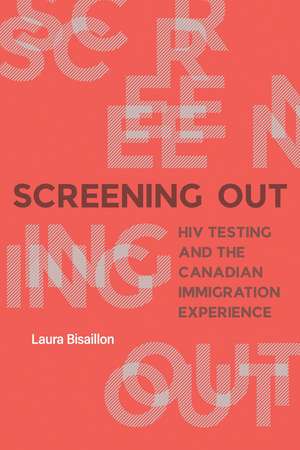Screening Out: HIV Testing and the Canadian Immigration Experience
Autor Laura Bisaillonen Limba Engleză Hardback – 30 apr 2022
What happens when people with HIV apply to immigrate to Canada? Screening Out takes readers through the process of seeking permanent residency, illustrating how mandatory HIV testing and the medical inadmissibility regime are organized in such a way as to make such applications impossible. This ethnographic inquiry into the medico-legal and administrative practices governing the Canadian immigration system shows how this system works from the perspective of the very people toward whom this exclusionary health policy is directed. As Laura Bisaillon demonstrates, mandatory immigration HIV screening triggers institutional practices that are highly problematic not only for would-be immigrants, but also for the bureaucrats, doctors, and lawyers who work within that system. She provides a vital corrective to state claims about the function of mandatory HIV testing and medical examination, pinpointing how and where things need to change.
Preț: 562.43 lei
Preț vechi: 610.68 lei
-8% Nou
Puncte Express: 844
Preț estimativ în valută:
107.63€ • 111.69$ • 89.96£
107.63€ • 111.69$ • 89.96£
Carte indisponibilă temporar
Doresc să fiu notificat când acest titlu va fi disponibil:
Se trimite...
Preluare comenzi: 021 569.72.76
Specificații
ISBN-13: 9780774867474
ISBN-10: 0774867477
Pagini: 288
Ilustrații: 1 map, 2 diagrams
Dimensiuni: 152 x 229 x 25 mm
Greutate: 0.66 kg
Editura: University of British Columbia Press
Colecția University of British Columbia Press
ISBN-10: 0774867477
Pagini: 288
Ilustrații: 1 map, 2 diagrams
Dimensiuni: 152 x 229 x 25 mm
Greutate: 0.66 kg
Editura: University of British Columbia Press
Colecția University of British Columbia Press
Notă biografică
Laura Bisaillon is a political sociologist and associate professor in the Department of Health and Society at the University of Toronto Scarborough.
Recenzii
“Screening Out is critically important to scholarship in (im)migration and health. Its concrete recommendations for policy change are key.”
